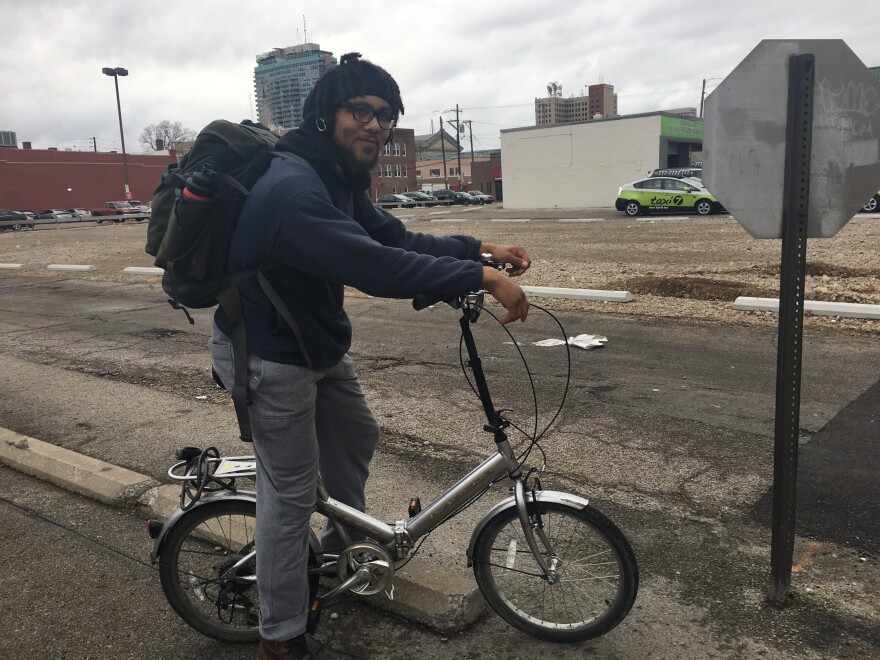The shoppers at the Kroger in Old Louisville on a recent morning included a mom at the checkout counter buying hair products and pacifiers, a dad with his infant strapped in front while looking at his grocery list in his left hand, and a woman in a wheelchair perusing the meat aisle.
Workers unpacked boxes of drinks and sold cakes and cookies in the bakery.
Mike Clark, 25, takes a bus downtown every day. He came to shop at the Kroger on his silver folding bike while on break. He bought apples and bananas to get him through until wrestling practice later in the day.
“Kroger’s a pretty decent place to get some organic stuff,” he said.
No matter if you’re buying pasta, cucumbers or almond butter, when you walk through this Kroger, you find an adequate supermarket. But it’s also a place where neighbors catch up and keep up with the news.
That will change at 6:01 p.m. on Saturday, January 28. The grocery store, which has been in the neighborhood for 37 years, will close its magnetic glass doors for good.
The owners, State Teachers Retirement System of Ohio, want to sell the property instead of continuing a lease, according to Tim McGurk, Kroger spokesman. He said the supermarket chain attempted to extend the lease until 2017, but those offers were rejected.
The building is for sale for $1.6 million.
For now, that leaves downtown — and surrounding neighborhoods like this one — without a grocery store nearby. And the people who will feel it most are those who don't just prize the convenience of a supermarket close by but depend on it.
Low-Income Families Lose Support
Sure, there are places to buy food in and around Old Louisville, including restaurants and fast-food joints.
But good luck to a shopper looking for a place to buy milk and bread after they get off work in the evening. Or the Old Louisville resident who depends on the Kroger pharmacy. Or one of the 520 families in the area who use WIC, the supplemental food program for low-income women and their children.
“The Second Street Kroger is by far the largest WIC vendor in the area and has the largest offering of fresh fruits and vegetables and other healthy foods,” said Brandy Kelly Pryor, director of Louisville Metro's Center for Health Equity.
There are options to help bridge the gap that will be left by Kroger's departure. The Gray Street Farmers Market is in nearby Phoenix Hill, for example. There are also several community gardens downtown and in Old Louisville.
But farmers markets typically operate between spring and fall. And they don't often have much beyond fresh fruits, vegetables and meats.
Cassia Herron is a community development professional and one of the organizers behind the Louisville Food Co-op initiative, which is seeking to create a community-owned grocery store run by a board. The plan is still in development, and the group's goal is to be up and running in at least three years.
Along with WIC families, the elderly are also a population that depended on a nearby supermarket and pharmacy, Herron said.
“I’m very disheartened that those folks aren’t going to be served,” she said.
Scale is Critical — and Scarce
Community gardens and farmers markets are part of an ecosystem of food that supports neighborhoods, but alone they're not enough.
“In Louisville, the consumer demand for food is about $3 billion a year. And apart from it being a huge economic engine ... it becomes an engine for health and well-being,” Pryor says.
In other words, aisles of cheese, eggs and peanut butter also spark social connectivity, Pryor said. For some vulnerable residents, a trip to the supermarket may be the only meaningful social interaction they get for the day.
For some shoppers, like Mike Clark, the simple solution is to go to another grocery store.
“I’ll probably ride my bike to other stores. There’s a Kroger up the road by U of L,” he says. “Stores close all the time.”
For others, it may not be so straightforward.
“Not only are we talking about nutrition, not only are we talking about women and families,” Pryor said, but isolation.







